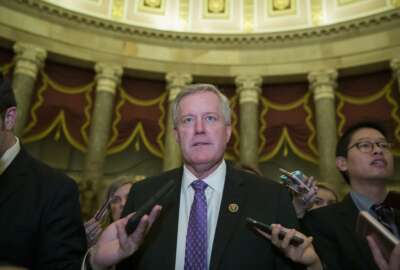
Is the civil service being destroyed? Or is it self-destructing?
Are federal workers being undercut by the Trump administration? Or is it the other way around? Depends on who you ask.
Are career federal workers — from the CIA and FBI to the EPA and Interior Department — being undercut, ignored or harassed by the Trump administration? Are long-time employees at the State Department or Veterans Affairs being ignored or punished for trying to do their jobs by political appointees and groups who think Washington is a swamp full of partisan bureaucrats who are out of of touch with Americans outside the beltway?
Or, have a handful, maybe more, civil servants chosen to bend or ignore legitimate orders they disagree with? Have some used their positions and back channels to undercut, ignore or harass Trump administration officials to slow, change or kill proposals that, by law, they are supposed to implement? Were they prepared since the election day surprise to do anything possible to make the Trump team fail?
The most likely answer… depends on who you ask.
So we turn to Theodore Roosevelt, the patron saint of the civil service (and the favorite of many Washington Nationals fans who root for Teddy at each home game when he and four other presidents — Jefferson, Washington and Lincoln — do a between innings race each time the team plays in D.C.). All this to introduce a guest column from Steven Hellem, a former Office of Personnel Management official, who wrote this:
What Would Roosevelt Do?
“Perhaps no leader from American history has more relevance to our current circumstances than Theodore Roosevelt. Just as Roosevelt and his generation grappled with the transformational changes of the turn of the twentieth century, we’re encountering corresponding challenges early in the twenty-first.
In the week of the anniversary of TR’s birthday — and in the centennial of his death — federal employees would do well to turn their attention to his enduring example.
More than any other president, Roosevelt possessed direct experience in state and federal personnel management. Just as he saw citizens as the foundation of the American nation, he saw public employees as the foundation of the federal government. TR respected them both as civil servants and individuals who deserved his respect and his ear, prior to making decisions that could impact the country or the world.
Through Roosevelt’s career—from his early appointment to the US Civil Service Commission through the presidency—civil service reform was a major, contentious public issue.
TR lamented that “the public service had by degrees been turned into a vast political engine; and thus even good public servants had become in many cases formidable instruments for thwarting the will of the people, and for debauching political life.”
Roosevelt tirelessly fought for a non-political civil service built on merit selection and retention. During his presidency, as reported by the Office of Personnel Management, the number of employees in merit system surpassed those of the partisan spoils system for the first time.
The expectations of employees under the merit system are high. “Character” in Roosevelt’s view would be a lodestar. This would include personal probity, integrity, and a strict adherence to the letter and the spirit of the law.
What about hard cases? What if a career employee believes the policies or directions issued from a presidential administration are illegal or against the national interest?
TR was unequivocal about the duties of citizens in such circumstances:
Patriotism means to stand by the country. It does not mean to stand by the president or any other public official, save exactly to the degree in which he himself stands by the country. It is patriotic to support him insofar as he efficiently serves the country. It is unpatriotic not to oppose him to the exact extent that by inefficiency or otherwise he fails in his duty to stand by the country. In either event, it is unpatriotic not to tell the truth, whether about the president or anyone else.
Surely Roosevelt would urge that federal employees have at least as great an obligation as ordinary citizens.
Roosevelt’s robust declarations of the duties of citizenship can ring alternatively self-righteous or naive in our cynical time. Nonetheless, his words retain power, because he so manifestly sought to hold himself to the same ideals. If federal employees understandably feel unappreciated and uncertain in recent decades, they might look to Roosevelt’s example and ideals for encouragement.
Sometimes — in Roosevelt’s time as in as our own — we must look to history for the enduring standards that would guide us. Today’s civil servants at all levels of government might well ask, as they seek to do their duty amid kaleidoscopic chaos: What Would Roosevelt Do?”
By Steven Hellem, Annapolis, MD; and James Strock, founder, Serve to Lead Group, former general counsel, USOPM, and author, ‘Theodore Roosevelt on Leadership.’
Nearly Useless Factoid
By Alazar Moges
You would be hard pressed to find too many people that don’t like dogs. Many studies have even shown that dogs go a long way in helping mediate interactions between family members. But did you know that an estimated 1 million dogs in the U.S. have been named as the primary benefactor in their guardians will? Gives a whole new meaning to “man’s best friend.”
Source: World Animal Foundation
Copyright © 2025 Federal News Network. All rights reserved. This website is not intended for users located within the European Economic Area.
Mike Causey is senior correspondent for Federal News Network and writes his daily Federal Report column on federal employees’ pay, benefits and retirement.
Follow @mcauseyWFED





